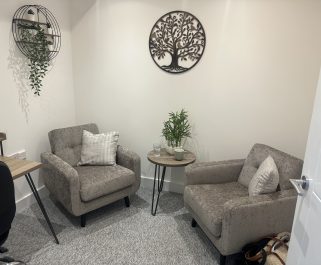For many people, the idea of counselling can feel both hopeful and daunting. You may have thought about reaching out for support but felt unsure about what to expect when you walk into a counselling room - or join an online session. This is natural, and it's one of the most common questions I hear: "What happens in a counselling session?"
At it's heart, counselling is about creating a safe, confidential, and supportive space where you can explore your thoughts, feelings, and experiences without judgement. It's a time dedicated solely to you, where you can be fully heard and understood.
Why People Come to Counselling
People seek counselling for many different reasons, and no issue is ever too big or too small to bring. In my work, some of the most common themes that clients explore include:
- Bereavement and loss - Grief is a natural response to loosing someone important, but it can feel overwhelming and isolating. Counselling offers a place to express the pain, remember the person who has died, and find a way forward.
- Complex grief - Sometimes grief doesn't follow the expected path. Complex grief may feel prolonged, intensely painful, or tangled with feelings such as guilt, anger or regret. It can occur when a death was sudden or traumatic, or when the relationship with the person who died was complicated. Counselling can help unravel these emotions and provide support in understanding and living with the loss.
- Relationship struggles - Whether with family members, friends or partners, relationships can be a source of both joy and difficulty. Counselling can help you reflect on patterns, set boundaries, and explore healthier ways of relating.
- Anxiety - Many clients come because of persistent worry, fear, or panic that gets in the way of daily life. Talking it through can reduce the sense of being trapped in anxious thoughts and allow a space for new coping strategies.
- Trauma - Difficult experiences, whether in childhood or adulthood, can leave lasting marks. Counselling provides a space to process trauma at your own pace, gently and safely. This doesn't mean that you have to go over every part of the trauma. When working with trauma I work in a way to see explore how that trauma is effecting you now, in the present moment.
- Life direction - Sometimes, people don't come with a single issue but rather a sense of being stuck. They may they've lost their way, don't know who they are anymore, or long for change but don't know where to start.
- Loss of health or self - A serious diagnosis, a long-term condition, or even a gradual change in energy or ability can lead to a deep sense of loss. Counselling can be a place to mourn what has changed and begin to find meaning.
Each person's story is unique, and counselling honours that uniqueness.
What to Expect in the Room
Counselling is often described as a "talking therapy" and conversation is central to the process. You set the pace and decide what feels important to bring. Sometimes you may arrive with a clear focus, at other times, it may take a little while to find the words. Both are welcome.
Sessions are relaxed and unhurried. You’ll have the chance to settle in, perhaps enjoy a warm drink or a glass of water, and take the time you need.
My role as a counsellor is not to give advice or tell you what to do but to walk alongside you - listening, reflecting, and offering gentle questions that may open up new insights. Together, we begin to make sense of your experiences and emotions in ways that feel safe and manageable.
Bringing Creativity into Counselling
While talking is key, counselling can also make use of creative approaches. In my practice, I often invite clients to bring their thoughts and feelings onto paper. This might involve:
- Mind maps – visually mapping out ideas or feelings around a central theme, helping to see connections that weren’t obvious at first.
- Timelines – setting out significant events in order, which can highlight patterns and bring clarity.
- Card sets – choosing images or words from a deck that resonate with how you feel, often unlocking perspectives that words alone might not capture.
These tools engage a different part of the brain and can bring surprising insights. For some clients, they make abstract feelings more concrete; for others, they help open up conversations that feel too difficult to begin with words.
A Word About Gestalt Counselling
My training is rooted in Gestalt therapy, a humanistic approach that emphasises awareness, connection, and the present moment. In Gestalt counselling, we pay attention not only to what you talk about but also to how you experience it in the here and now. This might include noticing body sensations, emotions that arise as you speak, or the dynamics of our interaction in the room.
Gestalt therapy values the whole person—mind, body, and emotions—rather than just focusing on problems in isolation. By becoming more aware of what’s happening in the present, people often discover new choices and perspectives that weren’t previously visible.
The First Step
For many, the first counselling session brings a sense of relief: finally having space to say what’s been on their mind without fear of judgement. Others may feel cautious, unsure if it’s the right fit. Both responses are normal. Counselling is a process, and the relationship between counsellor and client takes time to build.
To help ease any concerns and to support you in deciding whether counselling feels right for you, I offer a free initial telephone call. This gives us the chance to have a short chat about your situation, and it’s also a space where you can ask me any questions you may have. From there, you can decide whether you’d like to take the next step.
What matters is that you are not alone with what you’re carrying. Counselling offers the possibility of greater self-understanding, healing, and growth.
If you’re considering counselling, know that your story is welcome—whatever it may be.
If you’d like to arrange your free initial call, please get in touch with me here

